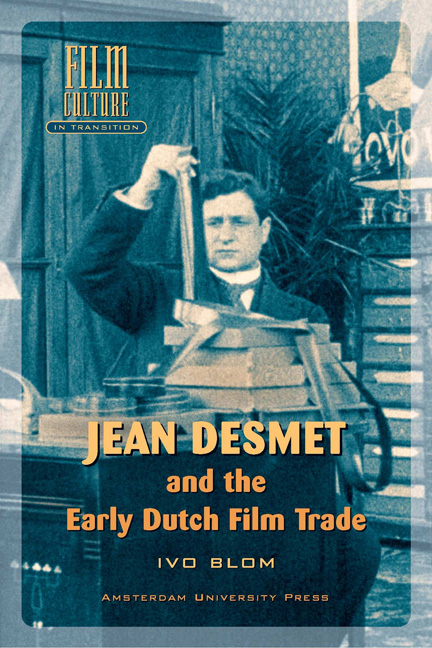Book contents
- Frontmatter
- Dedication
- Contents
- Preface
- Abbreviations, Unidentified Films and Historical Currencies
- Introduction
- I La Comète Belge: Jean Desmet’s Travelling Cinema, The Imperial Bio (1907-1910)
- II In The Beginning…: Film Distribution in the Netherlands Before Desmet
- III Gold Rush: In the Throes of Cinema Mania (1909-1914)
- IV Film Market Europe: Buying Films Abroad (1910-1914)
- V White Slave Girls and German Kultur: Film Rental and Distribution Strategies in the Netherlands (1910-1914)
- VI Onésime et Son Collègue: Competition (1910-1914)
- VII Das Ende vom Lied: The Impact of the First World War (1914-1916)
- VIII Quo Vadis?: Desmet’s Film Rental and Cinema Operation During the Great War (1914-1916)
- IX Afterlife: A New Career and the Beginning of a Collection
- X In Retrospect: Jean Desmet’s Place in Film History
- Notes
- Bibliography
- Photo Credits
- Film Culture in Transition
- Index of Film Titles
- General Index
IV - Film Market Europe: Buying Films Abroad (1910-1914)
Published online by Cambridge University Press: 14 January 2021
- Frontmatter
- Dedication
- Contents
- Preface
- Abbreviations, Unidentified Films and Historical Currencies
- Introduction
- I La Comète Belge: Jean Desmet’s Travelling Cinema, The Imperial Bio (1907-1910)
- II In The Beginning…: Film Distribution in the Netherlands Before Desmet
- III Gold Rush: In the Throes of Cinema Mania (1909-1914)
- IV Film Market Europe: Buying Films Abroad (1910-1914)
- V White Slave Girls and German Kultur: Film Rental and Distribution Strategies in the Netherlands (1910-1914)
- VI Onésime et Son Collègue: Competition (1910-1914)
- VII Das Ende vom Lied: The Impact of the First World War (1914-1916)
- VIII Quo Vadis?: Desmet’s Film Rental and Cinema Operation During the Great War (1914-1916)
- IX Afterlife: A New Career and the Beginning of a Collection
- X In Retrospect: Jean Desmet’s Place in Film History
- Notes
- Bibliography
- Photo Credits
- Film Culture in Transition
- Index of Film Titles
- General Index
Summary
Early in 1910, Jean Desmet began to diversify his activities in the film world. He now became a distributor as well as a cinema exhibitor. The story of the rise and flourishing of his distribution business provides an insight into the growth of Dutch and foreign film culture between 1910 and 1914. In this short period the Dutch film world underwent rapid and sweeping changes, which were partly determined by events abroad. In the years 1910-12, Desmet imported second-hand films from Germany which were delivered in readymade programmes. From 1912 to 1914, he purchased directly from production companies, or from international distributors and their agents who owned the rights for particular film companies. From this point onwards, his buying was centred on Brussels and Berlin. The source of the majority of these films, which are the basis of the present Desmet Collection, can be traced through an examination of Desmet's dealings with Westdeutsche Film-Börse and Deutsche Film Gesellschaft, his most important contacts in the period 1910-12, and with his principal suppliers in Brussels and Berlin in the years 1912-14. This chapter therefore focuses in detail on these contacts and the kind of films he acquired through them.
Second-Hand Films (1910-1912)
The German distributive trade. The acquisition of complete programmes and the rise of the long feature film
The beginnings of Desmet's film distribution are directly linked to important developments in Germany, which were already in evidence from 1906/7 onwards. Initially, both travelling showmen and permanent cinema operators simply bought their films. An example of this practice in the Netherlands is Frans Goeman of the Tivoli Winter Garden, who bought Pathé films in Paris up to 1907. Goeman changed half his programme every four weeks and then sold the worn films to smaller operators or to travelling showmen. He stopped buying and selling when Pathé introduced film rental in 1907.
Germany had a large number of cinemas from an early stage. The purchase of huge quantities of films created a need for dealerships. An extremely heterogeneous market in used films came into being, from film exchange fairs to small retailers.
- Type
- Chapter
- Information
- Jean Desmet and the Early Dutch Film Trade , pp. 133 - 186Publisher: Amsterdam University PressPrint publication year: 2003



